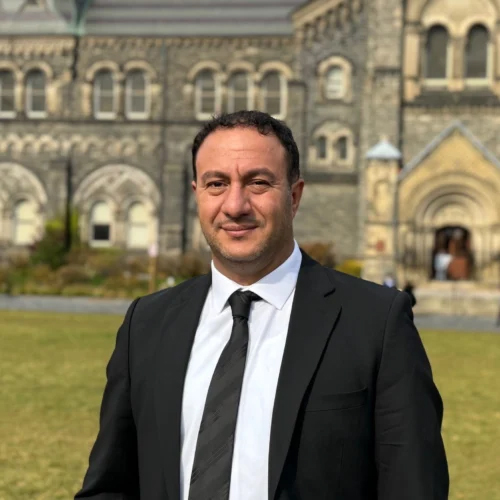Samer Ghazi’s (PhD 2024) doctoral research on non-myeloablative allogeneic hematopoietic stem cell transplantation in patients with sickle cell disease (SCD) and the subsequent impact on their quality of life, has earned him the 2025 Doctoral Dissertation Award from the Council of Ontario University Programs in Nursing. (COUPN)
“It is an honour to receive such an award, and to be selected and recognized by COUPN,” says Ghazi, who recently graduated with his PhD from the Lawrence Bloomberg Faculty of Nursing. “In presenting my results at various conferences in Europe and elsewhere, it has been rewarding to see many healthcare providers are interested in this innovative work that aims to support improvements in the suffering of patients with SCD.”
The treatment Ghazi has been evaluating, non-myeloablative allogeneic hematopoietic stem cell transplantation, is a chemotherapy free option available to some patients with SCD if they are a match with a healthy donor. The treatment itself works to reduce the impact of SCD on a person’s organs and can help limit the number of vaso-occlusive episodes and other numerous life-limiting complications they experience.
“SCD is an inherited blood disorder, and though it is now considered a chronic disease, many people do experience earlier mortality because of the cumulative effect of complications, such as multi-organ system damage and vaso-occlusive episodes where blood flow to the affected organ is diminished ,” says Ghazi who also works as a clinical instructor and currently practices nursing at UHN’s Princess Margaret Cancer Centre.
All of these complications can negatively impact a person’s quality of life, including their ability to work, attend school, or complete regular daily activities. It can also create an additional burden for the healthcare system Ghazi says, where those living with SCD requiring multiple ER visits or hospital admissions for supportive care in the form of blood transfusions.
Out of the 180 patients in the dataset Ghazi used for his study, all of whom were located in Saudi Arabia, 108 were offered stem cell transplantation and compared to a similar group of SCD patients that had yet to receive the treatment. The groups were compared in terms of their quality of life, work productivity, school and work absenteeism, activity impairment, and their health care utilization. Ghazi’s findings revealed that those who received the treatment reported a significantly better quality of life measurement compared to those still waiting for treatment. Most notably, the treatment group were 95% less likely than the comparator group to need a visit to the ER.
There are some risks associated with stem cell transplantation, including Graft-versus-host disease (GVHD), a common complication associated with transplants where the transplanted donor cells can attack the hosts tissues and organs.
This is why, Ghazi says, he wanted to evaluate the impact of this new stem cell treatment on the quality of life of people living with SCD, to help them make more informed decisions about their care.
“The most important impact of this study is for the patients themselves. The research question came from them and their struggle to decide about their course of treatment,” says Ghazi.
While the stem cell transplantation treatment is expensive and not always covered by insurance, Ghazi is hopeful that his research will provide some evidence for policy-makers in the future to consider making the treatment more accessible and affordable.
“There is an opportunity with this treatment to alleviate the suffering of those living with sickle cell disease, and improve their quality of life,” says Ghazi. “I hope that one day we will be able to offer this treatment to every person with sickle cell disease.”
The COUPN Doctoral Dissertation Award also recognizes Ghazi for his research dissemination in the areas of oncology and hematology, noting his work is making a significant contribution to both nursing education and nursing science.
